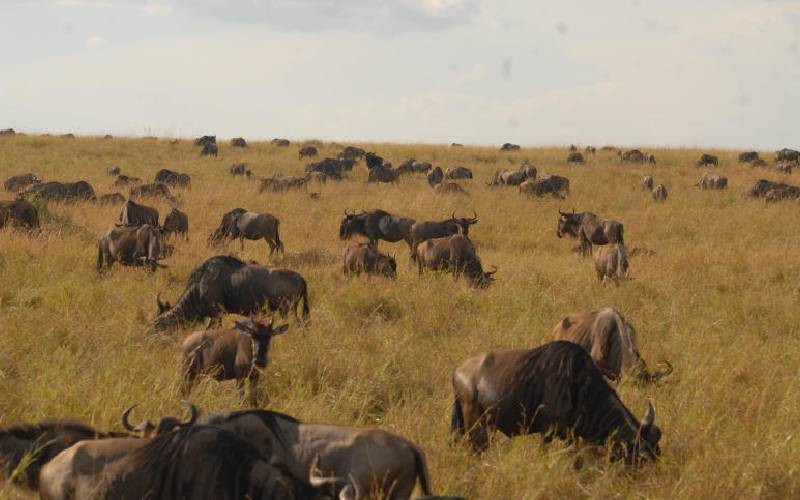By JUMA KWAYERA
The world-famous Masai Mara wildlife sanctuary is choking in filth because of increased human traffic, concerned tour operators claim.
They say the damage caused by growing numbers threatens to affect revenue accrued from the facility negatively. Tourism industry players fear that the push to sell Kenya in the Far East as a tourism destination has not been matched by measures to preserve the safari ecosystem.
The pressure subjected on the park came to light during this year’s wildebeest migration season, which saw a spike in the number of visitors from the Far East in addition to those from traditional markets. Competition to give them a great safari experience is now being blamed for unprofessional behaviour by some safari guides who break rules meant to protect the ecosystem.
Garbage problem
Tour operators say unmanaged access to the Masai Mara Game Reserve will be counterproductive as the heavy traffic takes its toll on the flora and fauna. Some have singled out increase in the new breed of tourists fearing their presence will put off “high-end” visitors who relish exclusivity and a pristine park.
Tom Lmakiya Lesarge, chief executive of the Kenya Professional Safari Guides Association (KPSGA), says the amount of waste deposited in the park is injurious to wildlife and their ecosystem. More importantly, Lesarge says, the teeming humanity interferes with the routine of wildlife.
The Masai Mara, an expansive ecosystem that borders Tanzania’s Serengeti National Park to the south, is a wildlife habitat famous for its wildlife that the include large populations of the lion, rhino, elephant, cheetah, giraffe, buffalo, leopard, primates and rare antelopes, among others. Because of this, it attracts more visitors annually than any of the country’s 22 parks and reserves.
“The Government has given licences to unprofessional tour operators who have no clue what they are doing,” laments Lesarge. “In the push to impress their clients in the hope of getting fat tips, they flout the rules at the expense of the ecosystem. Encroachment on the environment is rampant.”
Kenya Association of Tour Operators members are calling for installation of closed circuit television cameras to monitor tour operators’ behaviour the park.
In even more radical proposals, it favours locking out low-spending visitors. Former Kato chair Duncan Muriuki notes: “We have something unique to preserve in the Masai Mara and we have to get a bit snobbish about it. We have to aim at a non-mass market approach. Go for quality, not quantity.”
Devani Anjali of Travel Wild says players in the industry are agitated by the perceived indifference by Government agencies to the rapid environmental deterioration in the Masai Mara. “The only way (to stop the garbage problem is) to have a ‘financial gain’ system,” he says. “I would like to propose a heavy fining system — say $500 (Sh44,000) for anyone caught littering. From this, the ranger that imposes the fine should be entitled to $100, while the rest should go to Narok County Council.”
Minimum standards
In correspondence with Kato, Anjali says drivers that bring to NCC’s attention that someone has broken a rule should also gain through a financial reward, that should incentivise everyone to take action.”
Chinese, Korean and Thai tourists have come under fire for blatantly flouting park security and careless garbage disposal.
Stay informed. Subscribe to our newsletter
However, Shifan Wu, the head communications at the Chinese Embassy scoffed at the allegations, which he described as malice being propagated by Western tour firms.
“We have not received complaints about Chinese nationals polluting the Masai Mara,” Wu said. He added that he was concerned about negative media coverage despite massive Chinese investments in Kenya and assistance in protecting wildlife from poachers.
Wu’s observations tie with those of the Consumer Federation of Kenya chairman Stephen Mutoro who blames local agencies for failing to enforce the rules or setting minimum standard tourists should adhere to.
“There is weak oversight of national parks,” Mutoro says. “The public must demand minimum standards in the use of public utilities like parks. The laxity of public agencies is the basis for blaming foreigners.”
 The Standard Group Plc is a
multi-media organization with investments in media platforms spanning newspaper
print operations, television, radio broadcasting, digital and online services. The
Standard Group is recognized as a leading multi-media house in Kenya with a key
influence in matters of national and international interest.
The Standard Group Plc is a
multi-media organization with investments in media platforms spanning newspaper
print operations, television, radio broadcasting, digital and online services. The
Standard Group is recognized as a leading multi-media house in Kenya with a key
influence in matters of national and international interest.
 The Standard Group Plc is a
multi-media organization with investments in media platforms spanning newspaper
print operations, television, radio broadcasting, digital and online services. The
Standard Group is recognized as a leading multi-media house in Kenya with a key
influence in matters of national and international interest.
The Standard Group Plc is a
multi-media organization with investments in media platforms spanning newspaper
print operations, television, radio broadcasting, digital and online services. The
Standard Group is recognized as a leading multi-media house in Kenya with a key
influence in matters of national and international interest.








